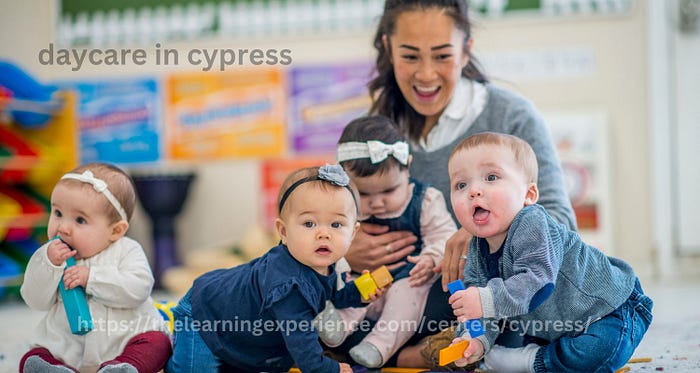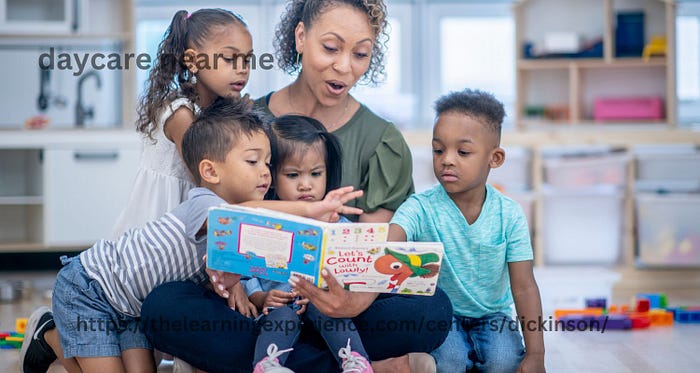How Daycare Providers Handle Sick Children: What You Should Know
As a parent, one of the most concerning aspects of daycare is how your child’s health will be managed, especially when they’re feeling unwell. Illnesses are a natural part of childhood, and at daycare, children are exposed to germs and viruses that can cause sickness. If you’re daycare in cypress looking for a daycare in Cypress or a daycare near me, it’s important to understand how daycare providers handle sick children to ensure that your child is in good hands when they aren’t feeling well.

In this blog, we’ll discuss how daycare providers typically handle sick children, the policies you should be aware of, and how you can work with your daycare to manage your child’s health effectively.
1. Clear Illness Policies
Every reputable daycare, whether it’s a daycare in Cypress or a daycare near me, should have a clear illness policy in place. These policies are designed to protect the health and well-being of all the children in care, as well as the staff. It’s essential that you review these policies when you first enroll your child, and keep them in mind if your child becomes sick.
Typical illness policies may include:
Fever: If your child has a fever over a certain temperature (usually 100°F or higher), they may be sent home and required to stay home until they are fever-free for at least 24 hours without medication.
Contagious diseases: If your child shows symptoms of a contagious illness (like the flu, pink eye, or a cold), they may be required to stay home for a specified period, as outlined by the daycare provider.
Vomiting and diarrhea: Children who experience vomiting or diarrhea are typically asked to stay home for 24 hours after the last episode.
Rashes or unusual symptoms: Any unexplained rash or symptom that might be contagious should be evaluated by a healthcare professional before your child returns to daycare.
These policies help prevent the spread of illness within the daycare and ensure that sick children are not exposed to other vulnerable children. Always make sure you’re familiar with your daycare’s specific rules, as they can vary from one center to another.
2. Immediate Communication
When your child shows signs of illness at daycare, providers will typically inform you right away. Most daycares will have a system in place to notify parents via phone or messaging apps when their child is sick or exhibiting concerning symptoms. It’s essential to keep your contact information up-to-date with the daycare so that you can be reached quickly in case of an emergency or if your child needs to be picked up early.
Some daycare providers, especially those near me, may also use apps or online systems where you can monitor your child’s health, daily activities, and any changes in their condition. This helps keep you in the loop throughout the day and provides peace of mind when you can’t be physically present.
3. Separation from Other Children
If your child begins to show signs of illness while at daycare, they will typically be separated from the other children to minimize the risk of spreading germs. Most daycares have a designated area, often called a "sick room" or "isolation area," where sick children can rest until they are picked up by a parent or guardian.
While in the isolation area, your child will be monitored by staff who can provide comfort and keep an eye on their condition. If needed, the daycare staff may provide a cold compress or help administer any prescribed medication, depending on the daycare’s policy.
4. Care for Mild Symptoms
Not all illnesses require immediate dismissal from daycare. For children with mild symptoms like a slight runny nose or minor cough, daycare providers often have the training to handle these symptoms in a way that keeps the child comfortable without posing a risk to others.
What you can expect:
Staff may monitor your child’s symptoms and provide appropriate comfort measures, such as offering fluids or helping them rest.
If your child is able to participate in light activities and is not overly fatigued or contagious, they may remain at daycare for a short period.
For non-contagious symptoms, such as teething or mild allergies, daycare staff may work with you to ensure your child is safe and comfortable while in their care.
However, if your child shows signs of worsening illness or becomes unable to participate in activities, they may be asked to go home earlier in the day.
5. Keeping Parents Informed
A good daycare provider will keep you informed of any health-related concerns. For example, if a child at the daycare has a contagious illness, such as chickenpox or the flu, providers often send home notices to alert parents of the potential exposure. This allows parents to monitor their children for any symptoms and take appropriate action.
If your child has been sent home with an illness, you should communicate with your daycare provider about any follow-up appointments or medical advice you receive from your healthcare provider. Some daycares may require a doctor’s note confirming that your child is no longer contagious before they can return.
6. Emergency Medical Care
In cases where a child’s illness or injury requires immediate attention, daycare providers are trained to handle emergency situations. If necessary, they will contact emergency services and parents right away. It’s important to provide the daycare with your child’s emergency contact information, medical history, and any known allergies to ensure they can respond quickly and appropriately if something unexpected occurs.
7. Preventative Measures
Prevention is key when it comes to managing sickness in a daycare setting. Many daycare providers, especially those located near me, take several precautions to minimize the spread of illness, such as:
Regular cleaning: High-touch areas like toys, tables, and door handles are cleaned and disinfected frequently throughout the day to prevent the spread of germs.
Handwashing: Children and staff are encouraged to wash their hands regularly, especially before meals and after using the restroom.
Vaccinations: Many daycares require that children are up-to-date on vaccinations, helping to reduce the spread of preventable diseases.
By maintaining these preventative measures, daycares help create a healthier environment for everyone.
8. What Parents Can Do
While daycare providers play an important role in managing sick children, parents also have responsibilities. To ensure the health and safety of all children at daycare, consider the following:
Follow illness policies: If your child is sick, keep them home according to your daycare’s guidelines daycare near me to prevent spreading germs to others.
Keep your child’s health records up-to-date: Ensure the daycare has your child’s current medical records, including any allergies or special needs.
Provide necessary medications: If your child needs to take medication during the day, make sure the daycare is informed and has the proper authorization to administer it.
Encourage good hygiene at home: Teach your child the importance of handwashing, covering coughs, and not sharing food or drinks with others.

Conclusion
Understanding how daycare providers handle sick children can give you peace of mind as a parent. Whether you’re looking for a daycare in Cypress or a daycare near me, choosing a provider with clear illness policies, effective communication, and trained staff is key to ensuring your child’s health and safety. Remember that every daycare provider has different protocols, so always ask about how they manage sick children during your initial visit. With the right daycare, you can rest assured that your child’s health is being taken care of, even when they’re not feeling their best.












